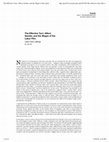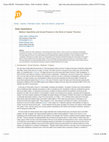Books by Leigh Claire La Berge

Marx for Cats: A Radical Bestiary , 2023
This book has its origins with Caroline Woolard in multiple ways. It was her idea to create the v... more This book has its origins with Caroline Woolard in multiple ways. It was her idea to create the video series Marx for Cats: she was the producer; she found the collaborators; she got the grants; she hired the assistants; she got the project into artist residencies; and, finally, when she was queried about producing a book proposal for an art press, it was she who asked: Could Marx for Cats be a book? I was only the one who wrote it, and it turned out not to be an art book but one certainly motivated and influenced by my time in different art spaces. The material that I've molded here into a historical narrative was developed in conversation with Thyrza Nichols Goodeve (and her six cats); with students, visitors, and J. Morgan Puett herself at Mildred's Lane; with glassblowers at Pilchuck; and with Athena Kokoronis at the Domestic Performance Agency. Those presentations occurred before the pandemic and they convinced me that this material could come alive in conversation with others. Presenting more developed material at the Zoom-mediated Red May festival during the pandemic was likewise important, and I thank Philip Wohlstetter for the opportunity to do so. Finally, this book is dedicated to two cats in my life, past and present. First, to the memory of The Mitten, who really was a naughty kitten, and who accompanied me on numerous physical and intellectual voyages. His spirit was as present in writing this book as his furry, concrete self had been the writing of in others. And second, to Lion, for many reasons. Meow.
Wages Against Artwork , 2019
Introduction to my new book, available now from Duke
Oxford University Press is a department of the University of Oxford. It furthers the University's... more Oxford University Press is a department of the University of Oxford. It furthers the University's objective of excellence in research, scholarship, and education by publishing worldwide.
Journal Articles by Leigh Claire La Berge
After Marx: Literature, Theory and Value in the 21st Century , 2022
Los Angeles Review of Books
There has long been a tension in Fredric Jameson's work regarding the extent to which it is possi... more There has long been a tension in Fredric Jameson's work regarding the extent to which it is possible or warranted to develop transhistorical categories for literary interpretation across of the whole of the capitalist mode of production. In my contribution to this symposium, I take up the problem of how Jameson's Allegory and Ideology participates in such questions in its consideration of periodisation and narrativisation through the particular construction of allegory, from the early modern age to our financial present.
Is There No Time? A Conversation with Mark Fisher , 2020
Is There No Time? A Conversation with Mark Fisher about politics, psychoanalysis, love and end-ti... more Is There No Time? A Conversation with Mark Fisher about politics, psychoanalysis, love and end-times.
Yesterday's Fake News: Donald Trump as a 1980s Literary Critic , 2020
A little journalistic piece about Donald Trump's failed try at literary criticism, circa 1987.
Chronicle of Higher Education , 2019
How should we respond to ads for "volunteer adjuncts?" I explore the long history of volunteerism... more How should we respond to ads for "volunteer adjuncts?" I explore the long history of volunteerism in US colleges and universities.

Post-45, 2019
No observer of contemporary American economic life can overlook the fact that real wages have rem... more No observer of contemporary American economic life can overlook the fact that real wages have remained almost unchanged for over forty years. Stagnant wages seemingly scandalize liberal platitudes of progress. As an economic matter, they limit consumption, and if productivity increases quickly while wages lag far behind, they can produce a crisis of overproduction. But while wages have remained largely stagnant, forms and modalities for thinking about labor have proliferated in critical theory and in literary and cultural studies. Over the last twenty years, scholars have developed an expansive terminology for describing labor: affective labor, cognitive labor, digital labor, gen-dered labor, feminized labor, consumer labor, intimate labor and sexual labor. Terms like "gendered labor ," "feminized labor," and "care work" (and rarely "sexual labor") have largely supplanted "house work"-a change we can attribute to the movement of more women into non-domestic workplaces and to the transformation of their formerly unwaged domestic work into the waged work of other, often non-white women. 2 Whereas Frankfurt-School "fellow traveler" Alfred Sohn-Rethel once argued that the crucial division under capitalism was between "intellectual and manual labor," and while Marx himself offered labor's basic division of "abstract labor" and "concrete labor," such terms are rarely used outside of political economy today. 3 As manufacturing has ceded the dominant share of the U.S. occupational field to service, "manual labor" has been replaced by "service work." "Mental labor" has declined in use almost to the point of obsolescence, only to be replaced by "cognitive labor," "creative labor" and in some cases "digital labor." With the attenuation of the social welfare state, "civic work" has become "vol-unteer work." "Emotional labor," a 1980s term that sought to account for a feminized formal labor, now seemingly falls under the broader rubric of "affective labor." Older distinctions such as skilled vs. unskilled or productive vs. unproductive likewise seem to have little currency today. In the proliferation of various new terminologies for naming labor, we can sometimes lose sight of the stagnant wages underpinning their emergence. I understand the proliferation of these terms as an expression of sociocultural critics' desire both to qualify how we work and to treat perceived changes in work as a means of periodization. Many of these substitutions and transformations may be traced to one of our most cited locations of contemporary economic break, namely the 1970s, as the Fordist mode of regulation and with it certain forms of Keynesian management ceded into what we now recognize as a financialized economy. With deindus-trialization in the U.S. and other developed countries, industrial wage labor ceded ground to service labor , reproductive labor, and affective labor-and it did so not only in the real economy, but in critical political economy as well. In this paper, I want to nuance this perceived relationship between changes in the way we talk about labor and changes in labor itself. Without a doubt, industrial work and wage-based Keynesianism gave way under the global economic restructuring of the 1970s. Yet instead of tautologically suggesting that a new period is defined by new labor, and that new labor inaugurates a new period, I want to understand the ways that changes in labor's organization make visible forms of labor always there but previously out of view. 4 Labor's categorical stability is more robust than the many supposed modifications of it imply. For instance, instead of arguing that women's presence in formal labor feminizes work in accordance with the parameters of a service economy, I suggest that as women enter the waged work
Los Angeles Review of Books , 2019
A RECENT SPATE of both liberal arts school and art school closings has reintroduced a sometimes d... more A RECENT SPATE of both liberal arts school and art school closings has reintroduced a sometimes dormant but never forgotten question: are the humanities entering their death throes? How do university finances both depend on and undercut the humanities, and how has the public funding of private education in the United States ensured that you no longer have truly public education?
A way to think labor after finanancialization, decommodifed labor refers to an emptying out of th... more A way to think labor after finanancialization, decommodifed labor refers to an emptying out of the same wage relation that nonetheless continues to structure our existence. In this paper, I put forth a theory of decommodified labor as one way to think labor in our present conjuncture.

In 2009 Forbes magazine ran an article that was one of a collection of postmortems on the 2007 -8... more In 2009 Forbes magazine ran an article that was one of a collection of postmortems on the 2007 -8 credit crisis and its (still) ongoing aftermath. Whether we call this economic event the Great Recession, following the work of Carmen Reinhardt and Kenneth Rogoff, or the endless crisis, following the work of John Bellamy Foster and Fred Magdoff, the incredible expansion and seismic contraction of global credit between 1992 and 2007 would seem to necessitate a serious review of the technologies and ideologies that enabled it. 1 This particular Forbes article was concerned that finance had become so complex that basic regulation of it was no longer possible. Not only might patrons cease to trust financial institutions, the writer worried, but financial institutions might cease to trust one another. "Without trust," the article claimed, "the necessary fictions of finance cannot function." 2 Forbes's readers never learned what those necessary fictions of finance were (or are). Indeed, adjectives such as fictitious and complex, the two that predominate in this article and many others like it, would seem less to elucidate financial operations than to obfuscate them. The article reveals an important trope in academic and popular writing about finance -that of the complex or abstract -and it deploys that trope to familiar ends: to call forth an immediately knowable and representable world of institutional financial transactions and then to suspend knowledge and description of that world by claiming its mechanisms are beyond our collective cognitive, linguistic, and epistemological reach.

This article considers the " debt visualizations " of social practice artist Cassie Thornton. Tho... more This article considers the " debt visualizations " of social practice artist Cassie Thornton. Thorton's works use a combination of photography, performance art, sculpture, non-fiction narrative, text, and hypertext to explore the cost and consequence of the accumulation of student loans. The essay examines Thornton's use of both traditional and non-traditional artistic materials and practices in order to articulate how the 'immaterials' of debt become an artistic medium; her radical departure from traditional media leads squarely back to the problem of the medium itself in Thornton's assertion that " debt is [her] medium. " While it is tempting to read such a claim as an embrace of a " post-medium condition, " this essay argues that in our highly leveraged present, the very form of unsecured student debt that Thornton works in and on invites a return to and a reconsideration of the seemingly conservative impulses of aesthetic Modernism and its critique.

In this article, I consider how descriptions of finance since the 2007-2008 credit crisis have of... more In this article, I consider how descriptions of finance since the 2007-2008 credit crisis have offered a new template of representation for value and its changing valences, both theoretical and aesthetic. My particular concern is social scientific writing about the crisis that might be grouped loosely under the rubric of 'performativity', namely the argument that models (or representations, either mathematic or linguistic) produce markets, and that markets are best studied through ethnographic observation. I ask why language, performance and metaphor itselfwhat was once the province of a more literary traditionhave become a methodological tool for social scientists now in their particular investigations of finance. I suggest that a more complete analysis of finance may be located if economic performativity and aesthetic theories of performance are brought into dialogue. In part one, I read the ethnographic work of Donald MacKenzie, most centrally, as well as that of Janet Roitman, both of whom have isolated some literary problem of the economy: performativity and narrative, respectively. In the second section, I look at a series of artists and theorists of performance who might be understood to offer a critique of the relationship between language, money and performativity.











Uploads
Books by Leigh Claire La Berge
Journal Articles by Leigh Claire La Berge